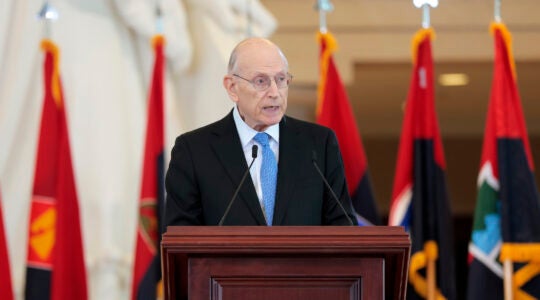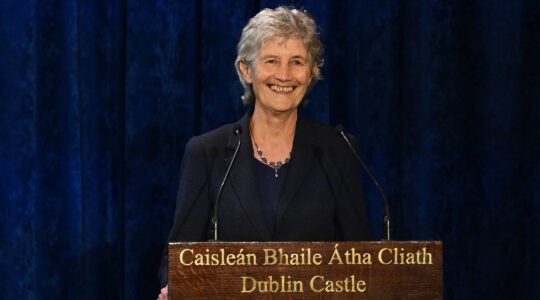CHISINAU, Moldova (JTA) — Standing opposite the house at Romana Street 13 in the Moldovan capital, a group of tourists is struggling to hear Irina Shihova’s account of the horrors that transpired here more than a century ago, but her voice is drowned out by a pop song playing on a nearby boombox.
Ignoring the distraction, Shihova, a historian at the Museum of Jewish Heritage in Moldova, explains how an anti-Semitic blood libel prompted locals to gather outside the house on April 19, 1903. Five Jews who lived inside were beaten to death in what would turn out to be the opening shot of the Kishinev pogrom, a three-day killing spree that left 49 Jews dead and which historians consider a turning point in the history of modern Zionism.
Only later does Shihova reveal that the pop song — “We Are the Champions” by Queen — is part of the epilogue to her story.
The song is the theme of this year’s graduation ceremony at ORT Herzl, one of two Jewish high schools in Chisinau, chosen for its evocation of Jewish survival in a spot that has come to symbolize the precariousness of Jewish life in Europe.
”The existence of a Jewish school opposite the massacre site is accidental,” Shihova told JTA, “but unbelievably symbolic.”
Like many Eastern European Jewish communities, Moldova is but a shadow of its former self. Before the Holocaust, half of Chisinau’s 125,000 inhabitants were Jews. Many had stayed despite the pogrom and a second that followed in 1905, but the community was all but wiped out by Romanian troops who deported 300,000 Jews from the territory that is today Moldova. Of the few that survived the Holocaust and returned, nearly all left following the collapse of communism in the 1990s, Shihova said.
However, unlike other former communist countries that are now part of the European Union and experiencing something of a Jewish cultural revival, Moldova remains small and poor. Shihova says the community of several thousand is mostly elderly people. Events involving more than a few dozen Jews are rare here, and graduates of ORT Herzl speak with uncertainty about the prospects for Jewish survival in the poorest country in the World Health Organization’s Europe zone, with a median monthly salary of $250.
”Approximately half of our class want to go away to Israel after graduation,” said Nataly Fedayava, an ORT Herzl graduate. ”I personally want to stay because my family is here, but maybe I, too, will go in the future. The general feeling is that if you want to develop as a young person, you need to leave.”
A walk around the centrally located Jewish school illustrates why so many Jewish youths contemplate leaving Chisinau, a sprawling Soviet city littered with crumbling mammoths that once were hotels and stadiums. The vast square leading to the central station here has the feel of a third world market, packed with hundreds of elderly people selling everything from kittens to rusty faucets, broken appliances and fishing nets.
”I think it’s horrible that so many old people need to sell junk in the sun to keep from going hungry, but this is what it’s like here,” Shihova said.
Such abject poverty has given the local Limmud Jewish learning conference a special significance it does not have in richer communities, according to Misha Gorbachov, the community’s deputy director.
First held in 2012, this year’s event was held last month and drew coverage from four national television stations. Participants arrived in elegant evening gowns and jackets and ties, a stark contrast to the casual style of Limmud conferences elsewhere in Europe.
“This may be a small, informal affair in countries with many Jews, but for us this is a big, big deal,” Gorbachov said. “It’s unique.”
Unusually for Limmud conferences — often grassroots, volunteer-based affairs — the Moldova event was co-sponsored by the local Jewish community along with Limmud FSU, a not-for-profit that has set up conferences across the former Soviet Union.
Even so, the community is too small and poor to hold the event every year. Limmud Moldova is the only one of Limmud FSU’s eight ongoing projects to take place biennially, according to Roman Kogan, Limmud FSU’s executive director. Still, some find it inspirational that the event takes place at all.
”The families of the Chisinau pogroms never received real justice at the time,” said Chaim Chesler, the founder of Limmud FSU. “Jews’ lives were cheap. The justice came later, in the presence of a Jewish school and a vibrant Jewish community right here after the Holocaust, after communism.”
JTA has documented Jewish history in real-time for over a century. Keep our journalism strong by joining us in supporting independent, award-winning reporting.





